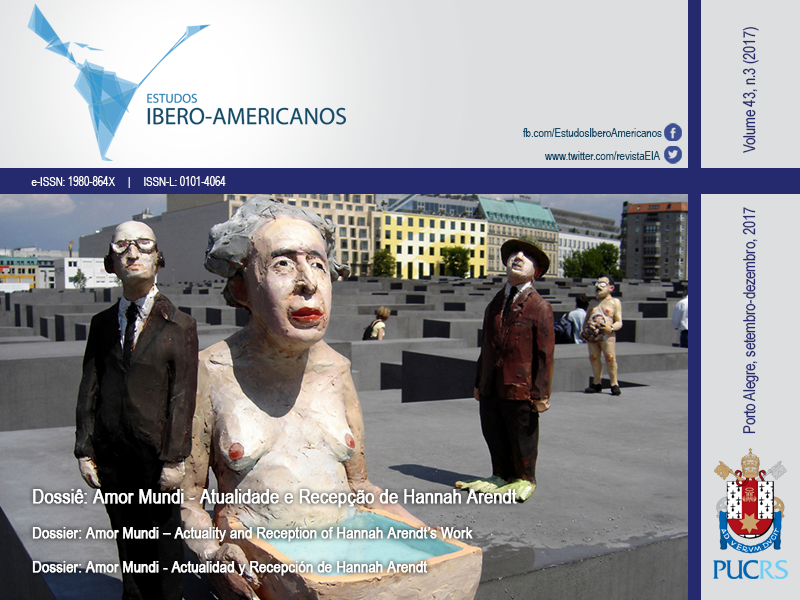The Power of Judging – or how to distinguish ‘indifference’ in Kant and Arendt. Some critical notes on the structure of activities
DOI:
https://doi.org/10.15448/1980-864X.2017.3.26140Palavras-chave:
Julgamento, Julgar, Indiferença, Arendt, Kant.Resumo
***O Poder do Julgar – ou como distinguir ‘Indiferença’ em Kant e Arendt. Algumas notas críticas sobre a estrutura das atividades***
Um dos cenários mais horríveis da Ética – mais do que a imoralidade ou amoralidade – é a indiferença moral. A obra final de Arendt, A Vida do Espírito, mostra uma faceta diferente da “indiferença” e a vê como um componente vital do julgamento e da reflexão. O seguinte artigo aborda esta compreensão da indiferença. Arendt extrai da Terceira Crítica de Immanuel Kant, onde a emoção e a experiência são consideradas constitutivas, em contraste com as duas Críticas anteriores, a primeira das quais trata da função lógica do julgar e a segunda do julgamento moral. A este respeito – o background arendiano para o julgar pertence à estética e não à ética – é a liberdade do juízo estético que garante seu potencial ético. No trabalho de Arendt, o julgamento é a base incontestável de seu pensamento. Além dos dois tipos convencionais de julgamento de Kant – determinantes e reflexivos –, ele apresenta uma terceira maneira de julgar em sua Crítica da Faculdade do Juízo. Somente esse terceiro juízo estético reflexivo subjetivo (subjektiv ästhetisch-reflektierendes Urteil) tem o potencial para o que Kant chama de “reabilitação da emoção”. Este terceiro tipo de julgamento demonstraria que aqui Kant combina uma forma de indiferença e a idéia de julgamento protótipo, dando à indiferença um aspecto positivo. E apenas essa terceira forma constitui a base para os pensamentos gerais de Arendt sobre julgamento. A gama de tipos de julgamento no pensamento de Kant poderia de fato ser interpretada não apenas como três maneiras diferentes de pensar, ao que ele se refere com o termo Denkungsart, mas sim como três maneiras diferentes de entender o mundo.É, portanto, de particular interesse para Arendt em termos do que ela chama mudanidade. A diversidade do julgamento elaborada na Terceira Crítica de Kant é uma expressão existencial da capacidade humana para o que é conhecido como “Haltung” na língua alemã e em todas as outras línguas apenas traduz-se fragmentariamente como “postura”, “hábito” ou “atitude”. Não é simplesmente a capacidade de adotar um certo “Haltung”, mas também de mudá-lo.
Downloads
Referências
ARENDT, Hannah. The Life of the Mind. One/Thinking. Two/ Willing. One-volume Edition. San Diego/New York/London: A Harvest Book, Harcourt Brace & Company, 1978 (1971).
ARENDT, Hannah. Vom Leben des Geistes. Das Denken. Das Wollen. Ed. by Mary McCarthy. München/Zurich: Piper, 1998.
BEINER, Roland. Essay: Hannah Arendt über das Urteilen. In: ARENDT, Hannah. Urteilen. Texte zu Kants Politischer Philosophie. Ed. by Ronald Beiner. München: Piper, 1998 (1985).
HERMENAU, Frank. Urteilskraft als politisches Vermögen. Zu Hannah Arendts Theorie der Urteilskraft. Kritische Studien zu Klampen. Lüneburg zu Klampen: VERLAG, 1999. Vol. 13.
HEUER, Wolfgang; ROSENMÜLLER, Stefanie; HEITER, Bernd (Ed.). Hannah Arendt-Handbuch. Lebe-Werk-Wirkung. Stuttgart/Weimar: Metzler, 2011.
HESSBRÜGGEN-WALTER, Stefan; KURBACHER, Frauke A. Self-criticism as a Way of Life. In: MCDOWELL, John. Reason and Nature. Lecture and Colloquium in Münster 1999. Ed. by Marcus Willaschek. Münster: Lit-Verlag, 2000. p. 59-67.
JASPERS, Karl. Psychologie der Weltanschauungen. München: Piper, 1985 (1919).
KANT, Immanuel. Kritik der Urteilskraft. Edited by Wilhelm Weischedel. Frankfurt a.M.: Suhrkamp, 1974.
______. Oxford World’s Classics: Immanuel Kants: Critique of Judgement. Translated by James Creed Meredith. Revised, edited,
and introduced by Nicholas Walker. Oxford: Oxford University Press, 2007 (1952).
______. Passion und Reflexion – Zur Philosophie des Philosophen. In: Aufklärung als praktische Philosophie. Ed. by Friedrich Vollhardt and Frank Grunert. Tübingen: Niemeyer, 1998. p. 253-268.
______. Urteilskraft als Prototyp. Kritische Überlegungen im Anschluß an Kants ästhetisch-reflektierende Urteilskraft. In: RODI,
Frithjof (ed.). Urteilskraft und Heuristik in den Wissenschaften. Beiträge zur Entstehung des Neuen. Weilerswist, Velbrück: 2003. p. 185-195.
KURBACHER, Frauke A. Selbstverhältnis und Weltbezug. Urteilskraft in existenz-hermeneutischer Perspektive. Hildesheim/
Zürich/New York: Olms, 2005.
______. Liebe zum Sein als Liebe zum Leben. In: Arendt, Hannah. Der Liebesbegriff bei Augustin. Versuch einer philosophischen Interpretation. Reprint 1929. Edited, and introduced by Frauke A. Kurbacher, translated by Kirsten Groß-Albenhausen with indices by Christine Albrecht. Hildesheim/Zürich/New York: Olms, 2006. p. XI-XLVI.
______. Hannah Arendt: Das Spätwerk – The Life of the Mind/ Vom Leben des Geistes – Das Denken and Das Wollen. In: HEUER, Wolfgang; ROSENMÜLLER, Stefanie; HEITER, Bernd (Ed.). Hannah Arendt-Handbuch. Leben-Werk-Wirkung. Stuttgart/Weimar: Metzler, 2011. p. 124-132.
______. Zwischen Personen. Eine Philosophie der Haltung. Würzburg: Königshausen & Neumann, 2017 (forthcoming). MERLEAU-PONTY, Maurice. Phénoménologie de la Perception. Paris: Gallimard, 1945.
______. Phänomenologie der Wahrnehmung. Berlin: de Gruyter,
(1966).
SCHILLER, Friedrich. Über die ästhetische Erziehung des Menschen. Stuttgart: Reclam, 2000.
VOLK, Christian. Urteilen in dunklen Zeiten. Eine neue Lesart von Hannah Arendts ‘Banalität des Bösen’. Berlin: Lukas, 2005.
VOLLRATH, Ernst. Die Rekonstruktion der politischen Urteilskraft. Stuttgart: Ernst Klett, 1977.
WALCH, Johann Georg. Gedancken vom Philosophischen Naturell. Reprint of 1723. Ed. by Frauke A. Kurbacher. Hildesheim/Zürich/
New York: Olms, 2000.
ZENKER, Kay. Denkfreiheit. Libertas philosophandi in der deutschen Aufklärung. Hamburg: Meiner, 2012.
Downloads
Publicado
Como Citar
Edição
Seção
Licença
Copyright (c) 2017 Frauke Kurbacher

Este trabalho está licenciado sob uma licença Creative Commons Attribution 4.0 International License.
Direitos Autorais
A submissão de originais para a Estudos Ibero-Americanos implica na transferência, pelos autores, dos direitos de publicação. Os direitos autorais para os artigos publicados nesta revista são do autor, com direitos da revista sobre a primeira publicação. Os autores somente poderão utilizar os mesmos resultados em outras publicações indicando claramente a Estudos Ibero-Americanos como o meio da publicação original.
Licença Creative Commons
Exceto onde especificado diferentemente, aplicam-se à matéria publicada neste periódico os termos de uma licença Creative Commons Atribuição 4.0 Internacional, que permite o uso irrestrito, a distribuição e a reprodução em qualquer meio desde que a publicação original seja corretamente citada.






